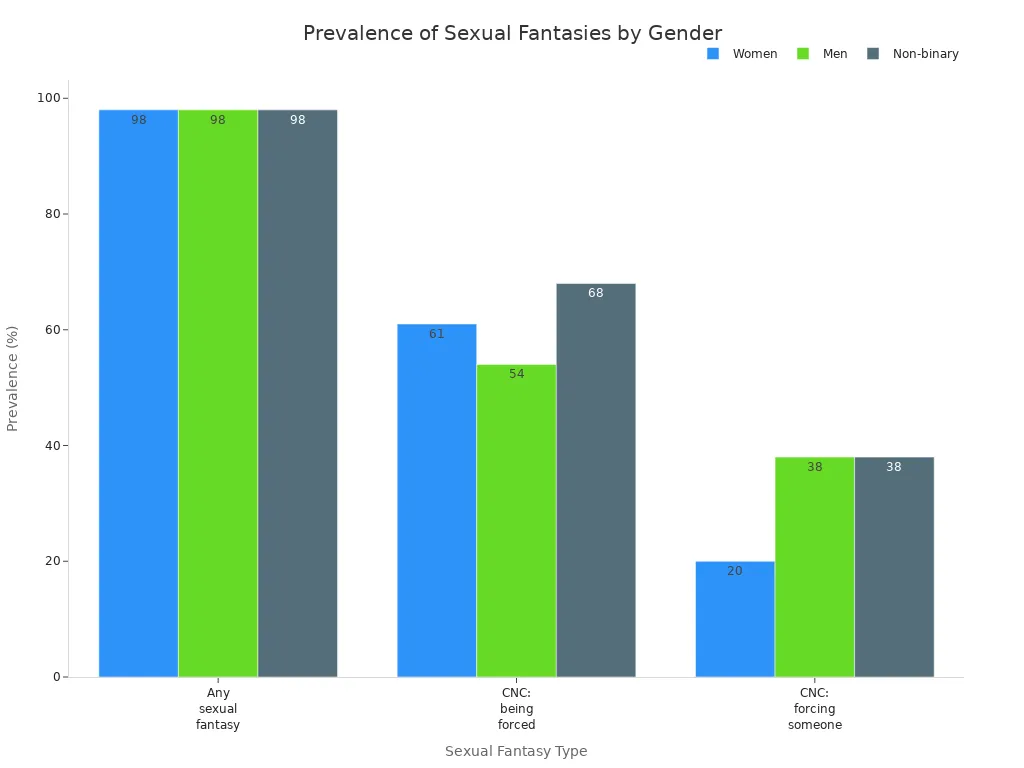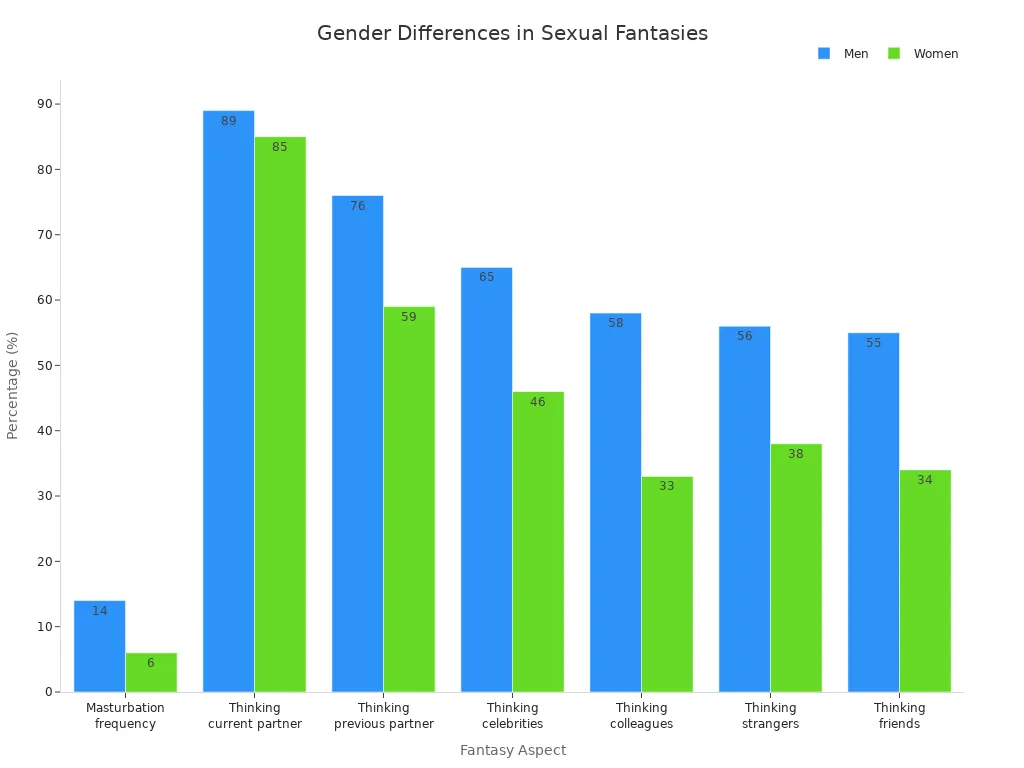Are Sexual Fantasies Normal Among Adults

Many adults ask, “Sexual fantasies: Are they normal? What purpose do they serve?” Experts confirm that sexual fantasies are a normal part of being human. People often wonder if everyone experiences them or if having such fantasies indicates something is wrong.
Sexual fantasies do not mean someone is unusual or has mental health problems.
Fantasies do not always reflect what people truly desire or intend to act upon.
Even those with healthy sex lives have sexual fantasies.
These thoughts can help individuals feel positive about themselves and gain a deeper understanding of who they are.
Key Takeaways
Sexual fantasies are normal for almost all adults. It does not matter what age, gender, or background they have.
These fantasies help people learn about their feelings. They can make sexual wellbeing better. Sharing them can make relationships stronger.
People have many kinds of fantasies. They often imagine new or exciting things. These thoughts do not always mean they want to do them.
Sexual fantasies change as time goes on. They show a person’s own experiences. They do not decide someone’s sexual identity or orientation.
Many people feel embarrassed about fantasies. But it is better to accept them without shame. Getting help if needed can make sexual and emotional lives healthier.
Sexual Fantasies: Are They Normal?

Prevalence
Many people ask if sexual fantasies are normal. They also wonder why people have them. Studies show almost all adults have sexual fantasies sometimes. A big survey in the United Kingdom found over 95% of adults have sexual thoughts or fantasies. This includes people of every gender, age, and background.
A study from 2022 showed both men and women often have sexual fantasies. People in their twenties and sixties both said they have these thoughts. This means age does not stop someone from having sexual fantasies.
Experts say sexual fantasies are a normal part of adult life. They do not mean anything is wrong. Most people have them, even if they do not talk about them.
Universality
People often ask if sexual fantasies are normal. They also want to know why people have them. This question is common in many talks. The answer is simple. Sexual fantasies are something everyone has. People from all cultures, religions, and backgrounds report having sexual fantasies.
Some people feel alone or odd because of their sexual fantasies. But almost everyone has them. These thoughts can be about many things. Some people imagine romantic moments. Others think about new things to try. Some people have sexual fantasies they never want to do in real life. This is normal.
Sexual fantasies help people learn about what they like.
They can make sexual experiences better.
They do not always match what someone wants to do in real life.
Here is a table that shows how common sexual fantasies are in different groups:
Group |
Percentage Reporting Fantasies |
|---|---|
Men |
98% |
Women |
95% |
Ages 18-29 |
97% |
Ages 60+ |
93% |
Sexual fantasies: are they normal? What purpose do they serve? The answer is yes, they are normal. They are a healthy part of being human. People should not feel bad about having sexual fantasies. These thoughts are a natural part of sexual wellbeing.
What Purpose Do Sexual Fantasies Serve?
Psychological Role
Sexual fantasies help people understand their own feelings. Many adults use them to learn about their sexual identity. These thoughts show what excites someone or what they might want to try. Fantasies can help people deal with emotions or past events in a safe way. Some people use sexual fantasies when they feel stressed or bored. Others find that thinking about different situations makes them feel happier and more confident.
Most adults who talk about their fantasies with partners get good or neutral responses. Sharing these thoughts can help build trust and make relationships stronger.
Sexual fantasies: are they normal? What purpose do they serve? Experts say that safe, agreed, and legal fantasies do not cause mental health problems. People with these fantasies often feel better about their sexual feelings. Problems only happen if fantasies cause upset or involve harm.
-
Consensual sexual fantasies can:
Help people understand themselves
Support emotional health
Help people feel less alone with their thoughts
Sexual Wellbeing
Fantasies often make sexual wellbeing better. They can increase sexual desire and make arousal easier. Many people find that thinking about fantasies during sex makes them more satisfied. Couples who talk about their fantasies may have better communication and feel closer. Sharing fantasies can help partners find new ways to connect.
Sexual fantasies: are they normal? What purpose do they serve? Research shows that acting on agreed fantasies can make sexual pleasure and relationships better. Most people do not have problems because of their fantasies. Only strong or upsetting urges may need help from a professional.
-
Sexual fantasies can:
Make sexual arousal stronger
Improve sexual satisfaction
Make partners feel closer
People should remember that having sexual fantasies is normal for adults. These thoughts help people enjoy their sexuality and know themselves better.
Types of Sexual Fantasies

Common Themes
Adults have many kinds of sexual fantasies. Some ideas are more common than others. Surveys say that multipartner sex, like threesomes, is the most popular fantasy. Many people also think about BDSM. This includes things like bondage, dominance, submission, and sadism or masochism. People like new and exciting things in their fantasies. They often imagine different places, strange situations, or breaking rules. Most people have at least one of these ideas. In fact, 97% of people say they have thought about them.
Many adults like to imagine places such as offices, public spaces, or clubs. These places make things feel more exciting and less boring. Most people do not want to do these things in real life. They use these thoughts to learn about their feelings and make their sex lives more interesting.
The table below shows how common some sexual fantasies are in different groups:
Sexual Fantasy Type |
Prevalence Among Women |
Prevalence Among Men |
Prevalence Among Non-binary Individuals |
|---|---|---|---|
Any sexual fantasy |
98% |
98% |
98% |
Fantasising about being forced (CNC) |
61% |
54% |
68% |
Fantasising about forcing (CNC) |
20% |
38% |
38% |
Roleplay is another way people try out sexual fantasies. Some examples are master and slave, job roles, age play, or religious stories. These activities let people safely explore things like consensual non-consent.

Diversity Across People
Sexual fantasies are different for everyone. Age, personality, and life stage all matter. Research shows sexual fantasies start when people are young and last into old age. Boys often have sexual fantasies by age 13 or 14. Masturbation, which often uses sexual fantasies, happens more in the late twenties and early thirties. Older adults also have sexual fantasies. This means these thoughts are normal at any age.
Personality can change what people like in their fantasies. Some people like to be in charge, while others like to follow. Men often have more dominant fantasies. Women may imagine men being in charge more often. These patterns come from ideas about gender and sexuality. But everyone has sexual fantasies, no matter their age or background.
Sexual fantasies change as people grow. They fit new experiences, relationships, and changes in life. This shows that sexual fantasies are a normal and healthy part of being an adult.
Differences and Similarities
Gender and Sexuality
Studies show people of all genders have sexual fantasies. These fantasies are not based on someone’s sexual identity. Kink, like BDSM or roleplay, is about what someone likes. It is not about who they are attracted to. Sexual identity is about who someone likes. But fantasies can be about many things and people.
Both men and women think about their partners in fantasies. Men imagine more different people in their fantasies. They often think about celebrities, colleagues, strangers, and friends. Women have these thoughts too, but not as much. The table below shows some of these differences:
Aspect |
Men (%) |
Women (%) |
Notes |
|---|---|---|---|
Masturbation frequency (weekly) |
6 |
Men masturbate more frequently than women |
|
Thinking of current partner |
89 |
85 |
Most in both groups think of current partner |
Thinking of previous partner |
76 |
59 |
Men more likely to think of ex-partners |
Thinking of celebrities |
65 |
46 |
Men more frequently imagine celebrities |
Thinking of colleagues |
58 |
33 |
Men more likely to imagine colleagues |
Thinking of strangers |
56 |
38 |
Men more likely to imagine strangers |
Thinking of friends |
55 |
34 |
Men more likely to imagine friends |
BDSM or roleplay fantasies |
71 |
N/A |
Common fantasy theme among participants |

Sexual fantasies are a private part of life. They do not decide someone’s sexual identity or orientation. People use fantasies to learn about themselves and for fun.
Relationship Status and Age
Being single or in a relationship can change fantasy topics. But everyone still has sexual fantasies. People in relationships often think about their partners. Single people may imagine new or old partners. Both groups keep having fantasies.
The type of fantasy changes as people get older. Young people often have more sudden and clear fantasies. Older adults have more private and planned fantasies.
People of all ages use fantasies to learn about their feelings.
As people age, they get better at knowing fantasy from real life.
Sexual fantasies stay with people as they get older. The topics may change, but having sexual thoughts is always normal for adults.
Stigma and Acceptance
Overcoming Shame
Many people feel embarrassed about their sexual fantasies. This embarrassment often comes from what society and culture say. Young people, especially girls, think sexual fantasies and popular pornography are not real or respectful. They might feel these fantasies do not fit what they truly want. Some say these images seem strange or even harsh. These ideas can make people feel far from their own sexual thoughts.
Beliefs from culture and religion also matter a lot. Some groups teach that sex is only for having children or that pleasure is bad. These beliefs create false stories and rules. People might feel they must hide their sexual identity or fantasies. Not having open, kind education makes it harder to accept these feelings.
Talking openly and learning honestly helps people feel less embarrassed. People can question old ideas and see that sexual fantasies are normal.
People can try different ways to feel better about their fantasies:
Be kind to yourself and notice your feelings. Remember, fantasies do not decide who you are.
Write or draw about your fantasies in a safe way.
Make private habits, like a special place or breathing exercises, to respect your wishes.
Talk to therapists who know about trauma and sexuality.
Pay attention to your body and mind. Take breaks and care for yourself when needed.
When to Seek Support
Most sexual fantasies are healthy and normal. Sometimes, though, they can make someone upset or get in the way of daily life. Signs that someone might need help include:
Sign or Impact Category |
Description |
|---|---|
Sexual thoughts feel hard to stop. |
|
Trouble finishing tasks |
Fantasies make it hard to get things done. |
Problems with relationships or health |
Fantasies hurt relationships or health. |
Feeling guilty or ashamed |
Strong guilt or shame about sexual thoughts. |
Money or work problems |
Fantasies cause money or school or job trouble. |
If sexual fantasies make someone feel upset, guilty, or cause problems, getting help from a professional can really help. Therapists can give safe, kind support and help people understand their feelings.
Sexual fantasies are a normal part of being an adult. It is healthy to accept these thoughts without feeling shame. Talking openly with partners can help in many ways. It can make people feel closer and trust each other more. It can also help people feel more confident about sex. People can better understand what they want and what their limits are.
If adults feel upset or confused, they can get help. They can use self-check tools, talk to sexual health therapists, or join support groups. These things help people learn about their fantasies in a safe way. They also help people keep good relationships.
FAQ
Do sexual fantasies mean someone wants to act them out?
Most people do not want to do every fantasy. Fantasies usually stay in the mind. They let people think about ideas in a safe way. Having a fantasy does not mean someone will do it for real.
Are sexual fantasies a sign of a problem?
Experts say sexual fantasies are normal for adults. They do not show a mental health problem unless they make someone upset or cause harm. Most people have them and feel okay.
Can sexual fantasies harm relationships?
Sexual fantasies alone do not hurt relationships. Talking honestly with your partner can help. Some couples feel closer when they share their fantasies. Problems only happen if fantasies cause secrets or make someone upset.
Do older adults have sexual fantasies too?
Yes, older adults have sexual fantasies. Age does not stop these thoughts. Studies show people in their 60s and older still have active sexual imaginations.


